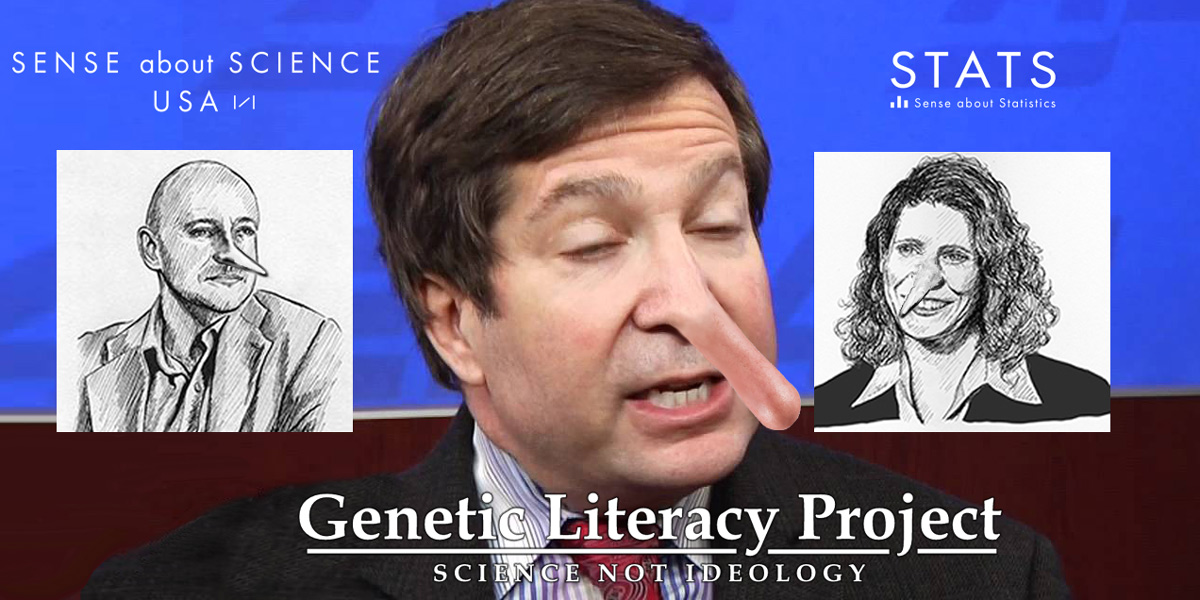
Groups claim to promote scientific information but operate like industry PR outfits and have links to tobacco lobbying
The Genetic Literacy Project, Sense About Science, and STATS claim to champion improved scientific understanding – yet they consistently promote industry-friendly messages and disseminate inaccurate and misleading information about science. A look at their industry links may explain the motives behind their campaigns.
The Genetic Literacy Project
The Genetic Literacy Project (GLP) runs a website featuring articles that defend GMOs and their associated pesticides, while attacking independent researchers and journalists that raise questions about them. The GLP claims its mission is to aid the public understanding of agricultural genetics and “promote science literacy”. But the “ICann Who Is” website, which records who is responsible for any given web domain, lists the registrant for GeneticLiteracyProject.org as a public relations company: ESG MediaMetrics.
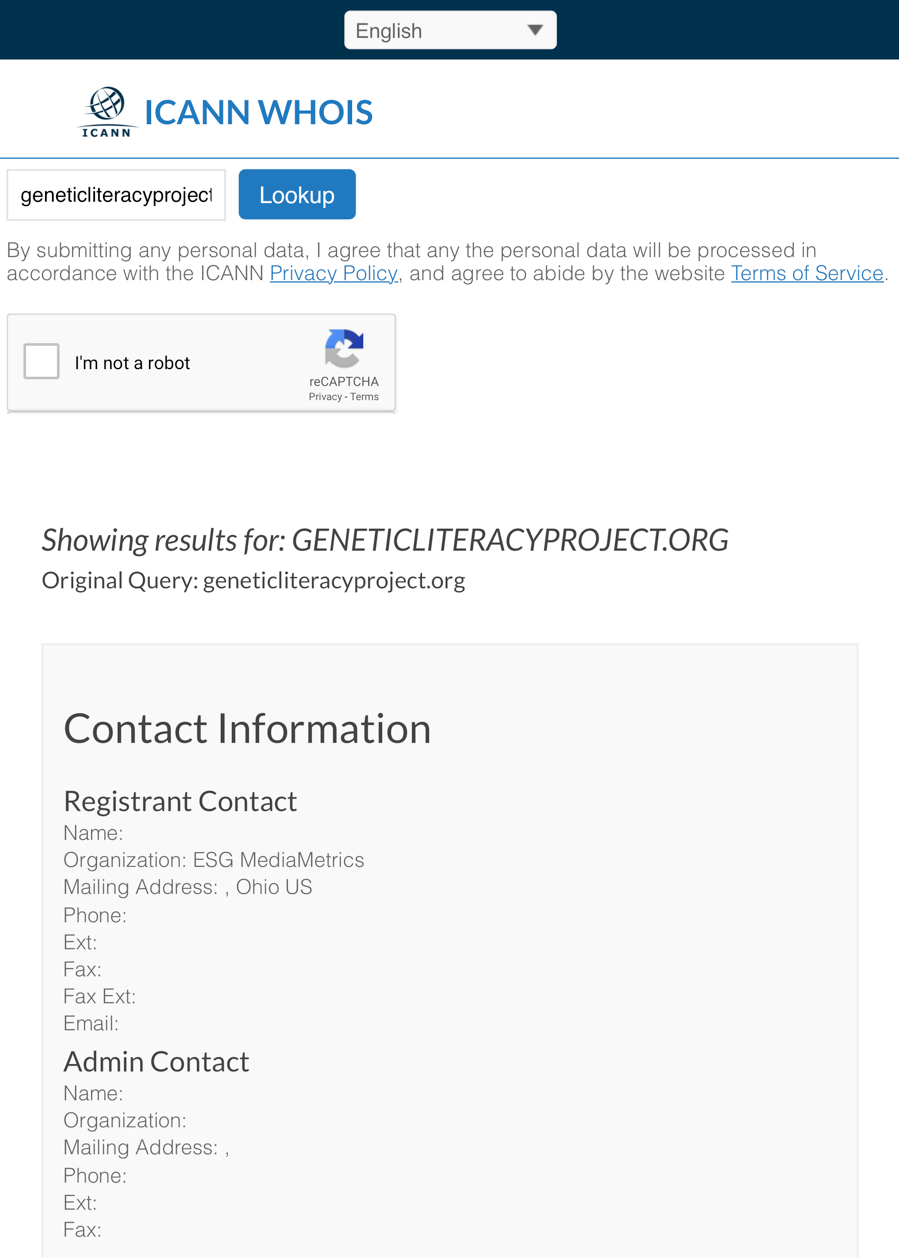
This Ohio-based PR outfit was founded by Jon Entine, and its clients include Monsanto, the Vinyl Institute, and Merisant, a Monsanto spin-off that manufactured artificial sweeteners.
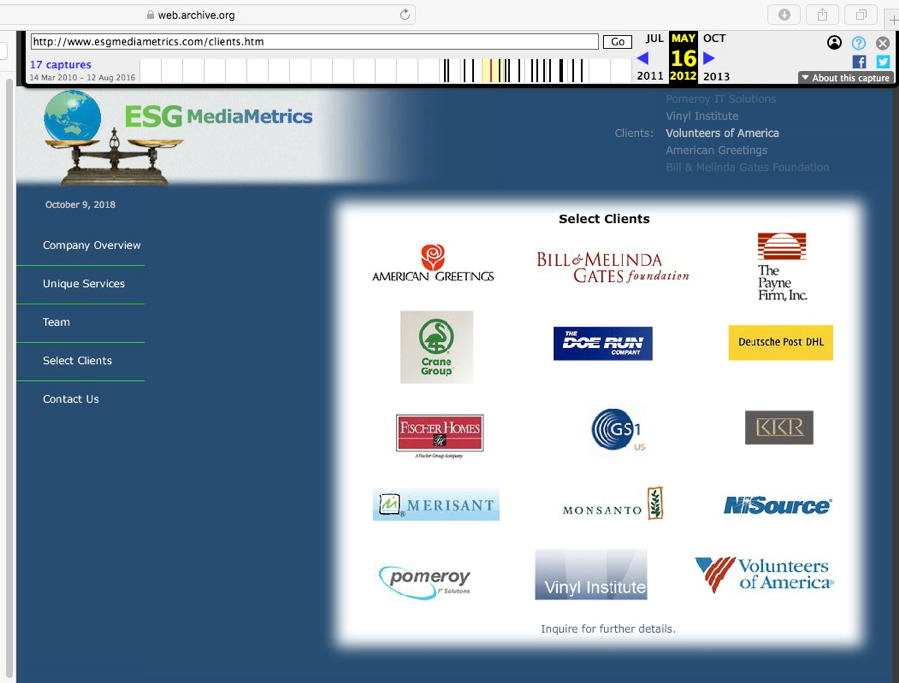
In other words, despite its proclaimed public interest mission, the GLP is the product of a PR firm that has worked for the agrochemical and plastics/chemical industries.
Although the GLP claims to receive its funding from non-industry sources, in 2017 it was named in a court filing as receiving funding from Monsanto. The GLP’s founding director Jon Entine is a long-time prominent defender of chemical industry interests. And a clear indication of the real mission of Entine’s GLP can be found in the “bio” for one of the GLP’s most prolific staffers – Cameron English: “Before joining the GLP, Cameron was the editor at Deniers for Hire, a project of the American Council on Science and Health [ACSH] dedicated to countering misinformation around genetic engineering.”
The ACSH is a notorious industry front group, funded by (among others) Monsanto. Its “Deniers for Hire” index slanders industry-critical academics, such as Naomi Oreskes and Marion Nestle, labelling them “Cranks and Gangsters”, as well as investigative journalists like Danny Hakim and Eric Lipton of the New York Times, whom it dismisses as “Bad Journalists”, even though both are Pulitzer Prize winners.
All these targets of “Deniers for Hire” are also targets of the GLP. In other words, Cameron English's work at ACSH qualifies him to work for the GLP because they are in the same business: shutting down scientific debate by villainizing those who raise questions inconvenient for industry. And as we shall see, the GLP is also intimately interconnected with other organizations that stand accused of running industry-funded disinformation campaigns.
Sense About Science
Sense About Science (SAS) claims to be “an independent campaigning charity that challenges the misrepresentation of science and evidence in public life” and works “to ensure the public interest in sound science and evidence is recognised in public discussion and policymaking”.
However, a Monsanto internal document released as a result of US cancer litigation describes SAS and the GLP as “Tier 2” “Industry Partners” in Monsanto’s public relations campaign to “orchestrate outcry” about IARC’s cancer designation of glyphosate weedkiller as a probable carcinogen. It is significant that this was in February 2015, before IARC published its verdict on glyphosate. This suggests that Monsanto fully expected that IARC would decide that glyphosate was at least a probable, if not a known, carcinogen. Monsanto also names the controversial pro-GMO organisations Biofortified and Academics Review as “Industry Partners” in the same category.
SAS began in the UK, where it has consistently promoted and defended GM crops. It opened a US office (SAS USA) in 2014 under the direction of Trevor Butterworth, who has a long history of spinning science for corporate interests. In an exposé in The Intercept, journalist Liza Gross wrote, “Sense About Science claims to champion transparency” but “does not always disclose when its sources on controversial matters are scientists with ties to the industries under examination”. Gross called SAS a group of “self-appointed guardians of ‘sound science’” which serves to “tip the scales toward industry”.
At first glance, SAS and the GLP appear to be independent of each other. But this is far from the case, as becomes apparent with a look into yet another organisation that downplays the health risks of industrial products.
Statistical Assessment Service (STATS)
Both the GLP and SAS have links with the Statistical Assessment Service (STATS), a now-defunct public messaging outfit that has been adopted by SAS USA. SAS USA describes STATS as “our collaborative project with the American Statistical Association to improve statistical literacy among journalists, academic journal editors, and researchers”. Those trying to access STATS’s old website, stats.org, are redirected to the site of SAS USA.
Links with George Mason University
The GLP, SAS, and STATS all have links with George Mason University (GMU), which “provided accounting services to the GLP from 2011–2014”, according to the GLP website. The website also states that Jon Entine was a senior fellow at GMU, adding that the GLP was “an independently operated division of the Statistical Assessment Service, housed at GMU, until 2014” and that it secured independent nonprofit status in 2015.
GMU, which has been called “a center of libertarian scholarship”, has received many millions of dollars in donations from right-wing pro-industry donors who deliberately invest in universities for political purposes. In particular, GMU has been one of the largest recipients of donations from the Charles Koch Foundation in return for both ideological vetting of students and a say in the hiring and firing of professors. Revelations over these donations and the strings attached led the GMU's president Angel Cabrera to admit that such agreements with donors “fall short of the standards of academic independence I expect any gift to meet”.
The GLP, SAS, and STATS are also linked to GMU via their key affiliate Rebecca Goldin, who has worked for all of them. She is a professor of mathematical sciences at GMU and director of STATS. Goldin and Butterworth are the only named staff members of SAS USA.
Stealth defender of the plastics industry
STATS director Goldin is on record as downplaying the risks of phthalates, a controversial class of plastics ingredients, in the wake of research showing that they can affect the development of children exposed in the womb.
STATS has also published articles downplaying the health risks of various industrial products, including phthalates, the endocrine disruptor bisphenol A (BPA), flame retardant chemicals in mattresses, and PVC. An investigation by the Milwaukee-Journal Sentinel noted that STATS had acted as “a stealth public relations defender of the plastics industry”. The journalist Paul Thacker described STATS as an “industry-funded disinformation campaign”.
Trevor Butterworth and product defence
Many of STATS’s “product defence” articles were authored by Trevor Butterworth, who became the organisation’s editor in 2015–16.
Butterworth (of STATS and SAS USA) has also published articles in Forbes defending BPA and the artificial sweetener Splenda against independent research indicating health risks from exposure to the substances.
In an article for the British Medical Journal with the self-explanatory title, “A series of journalism conferences on obesity received covert funding from Coca-Cola”, Paul Thacker noted that Butterworth was the only apparent “journalist” brought into the 2014 conference by Coca-Cola to educate reporters. Before the 2014 journalism conference, as Thacker pointed out, Butterworth had written an article criticizing a study in PLOS Medicine that examined conflicts of interests and reporting bias in studies associating sugary beverages and weight gain. A Coca-Cola executive described Butterworth in an email as “our friend".
Links to tobacco lobbying
The GLP, SAS, and STATS are also all linked to the Center for Media and Public Affairs (CMPA) to the extent of sharing exactly the same address and contact number (see below). The CMPA is highly controversial because in 1994 it was hired by tobacco giant Philip Morris to counter “personal and public bias” in stories about cigarettes’ health risks.
The GLP does not appear to exist as a nonprofit under its own name as it comes under the Science Literacy Project (SLP), which is also the organization that STATS turned into.
The key to uncovering these links is the Guidestar website, which lists the details of non-profits. The site publishes the organisations’ self-descriptions, with details such as the identity of the principal officer. It also hosts the income tax reporting forms (“990s”) that US tax-exempt organizations have to file with the Internal Revenue Service (IRS) each year.
Documents available on Guidestar make clear that SAS USA and the SLP are both reincarnations of STATS. It appears that they are simply the same organisation, changing its name.
For instance, STATS’s self-description explains that STATS has two components. The first is Sense About Science USA, “who’s [sic] goal is to promote scientific evidence and transparency in society and to equip the public, journalists and policy makers with the tools and information to make sense of science. The second is STATS.org, a website and educational project to analyse and explain statistics in the news and to promote statistical literacy in the media and society. STATS.org is a joint project of the American Statistical Association and Sense About Science USA.”
STATS describes itself as “aka [also known as] Stats.org, Sense About Science USA”.
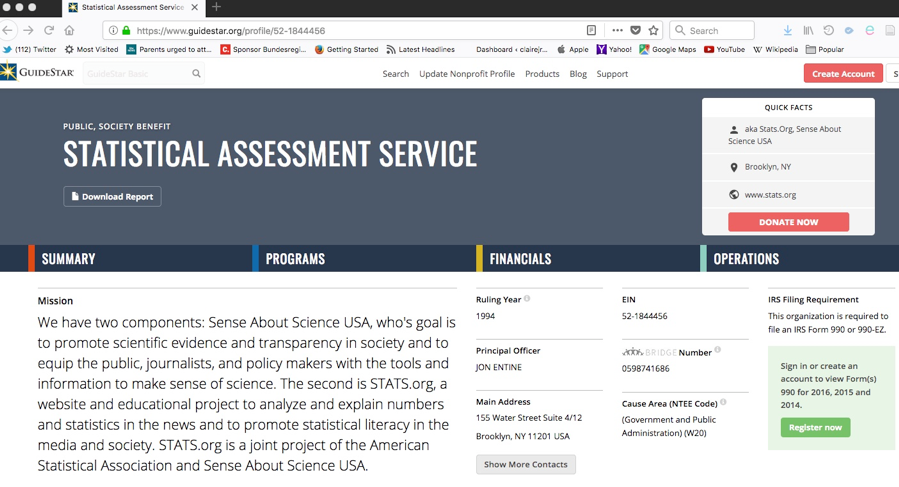
STATS’s principal officer is named as Jon Entine, founding director of the GLP, and its address is given as 155 Water St, Ste 4/12, Brooklyn, NY 11201.
An old (2013) archived version of the STATS website features the emblem of the Genetic Literacy Project in the upper left hand corner.
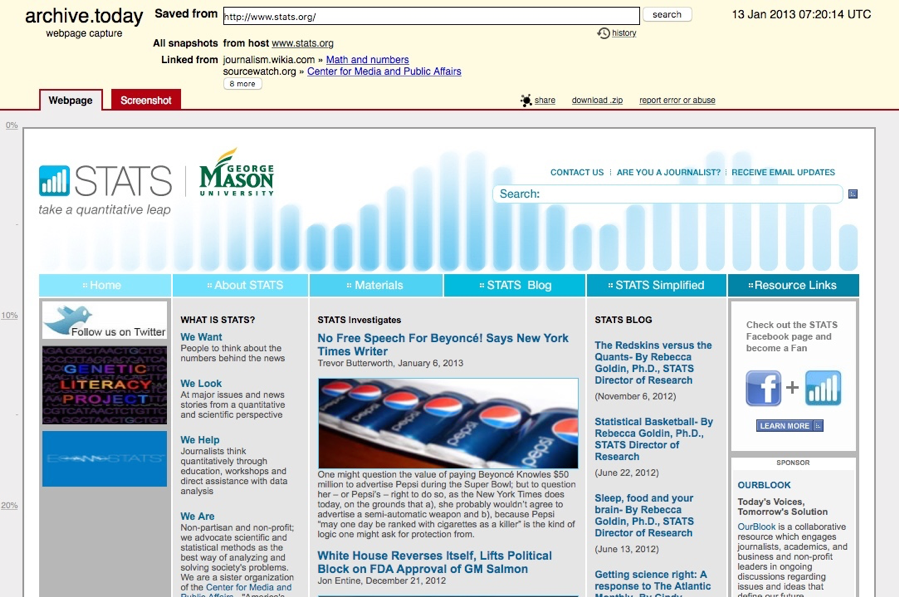
The 990 forms filed for STATS for the tax year 2013–14 and 2014–15 give the name of the organisation as the Statistical Assessment Service, as one might expect.


However, in the 2015–16 form filed for STATS, the Employee Identification Number (EIN) organisation remains the same, but the name has changed to the Science Literacy Project (SLP).

The principal officer and address for tax purposes have also changed. While STATS’s principal officer in 2013–15 was Dr S. Robert Lichter and its address was Arlington, VA, the principal officer of the organisation into which STATS morphed in 2015–16, the SLP, is Jon Entine and its address is in Lansdale, PA.
In short, Entine appears to have taken over STATS and it has been renamed the SLP. A note on the form explains that on 1 July 2015, the Statistical Assessment Service “was separated into two separate organizations this resulting organization [sic] Science Literacy Project and Sense About Science”.
The listed directors of the SLP include the GMO-promoting scientists Pamela Ronald and Geoffrey Kabat.
In 2013 the GLP’s then address (in Arlington, VA) and contact number were identical to those of the CMPA and STATS, according to the GLP’s website. This ties both the GLP and STATS to the tobacco lobbying organization, the CMPA.
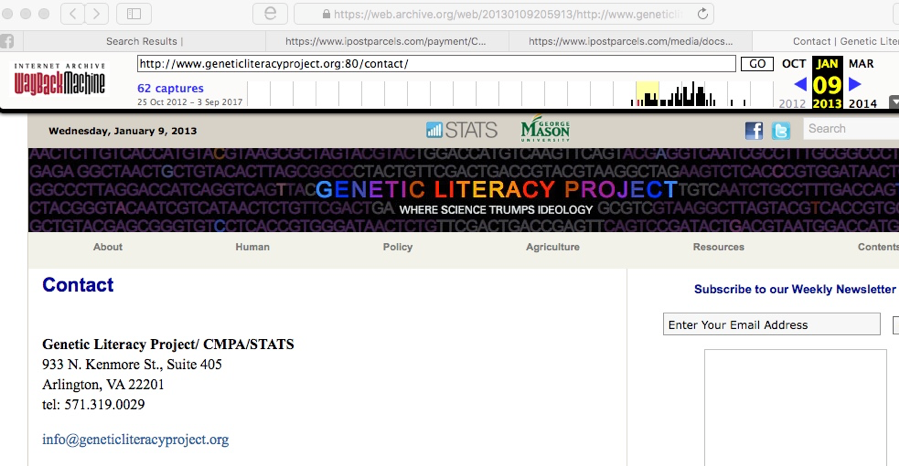
Sound science or corporate public relations?
STATS, the GLP, and SAS claim to be all about promoting sound science in public debate and policy making, but their origins and personnel make it abundantly clear that they are not in the business of improving the quality of scientific discourse, but of running a public relations campaign aimed at manipulating and inhibiting scientific debate to serve corporate interests.